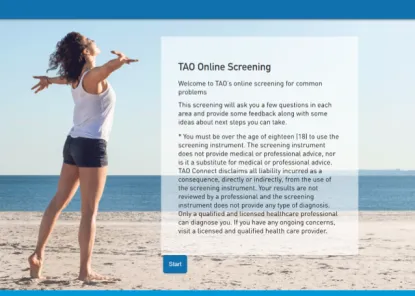What is TAO – Therapy Assistance Online?
It may be helpful to think of TAO as an online library of engaging, interactive programs to learn life skills and to help you bounce back from disappointments or stumbling blocks in life.
Educational Modules: High quality, entertaining, and interactive learning modules, using evidence-based theories.
Assessments: Provide progress and outcome measures, along with screening for behavioral health problems, if desired.
Practice Tools & Logs: Tools to reinforce skills learned in the educational modules, including daily logs and journals.
Mindfulness Library: Valuable resource to learn and practice mindfulness and meditation.
We are excited to provide you with very powerful evidenced-based, learner-focused content that aims to increase positive and adaptive behavior. Using TAO you will learn:
Personal Skills: For developing personal agency and managing oneself
Cognitive Skills: For analyzing and using information
Inter-Personal Skills: For communicating and interacting effectively with others
How to Sign-Up for TAO
- In your browser window, navigate to us.taoconnect.org/register.
- Enter First Name, Last Name, and your school email address.
- Create a Password. Do not reuse your NMU password for this site.
- Leave the 'Enrollment Key' field blank.
- Click Sign Me Up.
- Check your email. You will be sent a Welcome to TAO email with a confirmation link which you must click on to sign in.
Pathways
Each pathway could be considered its own textbook, with each module in that pathway representing a chapter of the book, and each module session representing a subheading of the chapter. As you watch videos and engage with our interactive components, you'll gain the knowledge, self-awareness, and skills you need to achieve your goals.
You can complete TAO at your own pace, whether that's just one session a day, or perhaps two whole modules. It's entirely up to you.
Review the descriptions of each pathway below. You may complete as many pathways as you like. If you have put some effort into one and it does not seem to be resonating with you, you could consider trying another to see if that might better help you reach your goals. TAO is not one size fits all, and we encourage you to play around to find what works most effectively for YOU!
Topics
Calming Your Worry - You may select from two versions of this pathway: one focuses on broad life experiences, while the other is tailored to the challenges of the college student. In either version, you will learn to recognize and understand how your thoughts influence your feelings and behaviors. By learning to catch negative thoughts and consider them in a more positive light, you will find that you begin to act with greater confidence. As you realize you have control over your thoughts, you'll worry less about the challenges ahead, knowing that you have the ability to persist through difficulties.
Let Go and Be Well - Resilience is the psychological concept of successfully processing and adapting to change and stress; this pathway guides you to a place where you can begin to accept and embrace your life fully- even its challenges. Improving your abilities to accept and adapt to unexpected events in your life can lead to marked improvement in both functioning and mood. In addition to learning mindfulness techniques that allow you to practice being in the present moment, you will also begin to clarify and understand your own personal values. By committing to living a life that follows those priorities, you will likely find greater peace and well-being.
Interpersonal Relationships and Communication - Relationships can be challenging sometimes. This pathway will help you understand how to improve your relationships by building communication skills, learning to recognize unhealthy relationship behaviors, and finding ways to manage anger. You'll also learn how to respond more effectively to others.
Leave Your Blues Behind - When life feels low, it's easy to think negatively. This pathway will encourage you to find ways to think more positively; in doing so, you'll notice that you don't feel quite as blue anymore. As you learn to pay attention to your thoughts and find ways to view situations in a more constructive light, you'll find that your behaviors become more positive as well. This pathway also includes a section on mindfulness techniques, which will help you learn to be present in your life and find peace in the moment.
Improving Your Mood - This pathway will teach you that there is some truth behind the phrase "fake it till you make it." When we feel down, it's easy to begin to withdraw from others, which leads to a cycle of continuing to feel blue. By learning to challenge yourself to engage with your life, even when you don't initially feel like it, you'll actually begin to feel better and think more positively.
Evaluating Alcohol and Drug Use - This pathway is for people seeking more knowledge and information about the role substances play in their lives. In these lessons, you will reflect on your own choices regarding alcohol and drug use, and make a plan for any changes you'd like to make in these behaviors.

